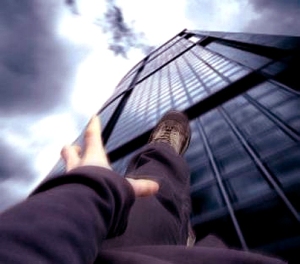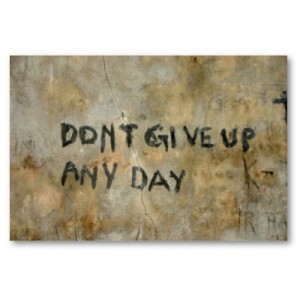There are two ways I didn’t react to the death of Osama bin Laden. The first is exemplified by the hordes of half-clad OSU undergraduates that jumped into Mirror Lake waving American flags and chanting U-S-A, U-S-A on Sunday night. I was there, and found the scene unsettling and confusing.
The second way I didn’t react (and I feel some guilt in admitting this) was:
I mourn the loss of thousands of precious lives, but I will not rejoice in the death of one, not even an enemy. Returning hate for hate multiplies hate, adding deeper darkness to a night already devoid of stars. Darkness cannot drive out darkness: only light can do that. Hate cannot drive out hate: only love can do that.
– Martin Luther King, Jr.
MLK Jr. really knew how to write an inspiring quote. And he was absolutely right. No good comes of hating people. Rejoicing at a person’s death–even a bad person’s death–is unfeeling and wrong. But I’m going to argue that, for those kids in Mirror Lake, and for me, and I suspect for a lot of other people as well, Osama bin Laden has never really been a person.
First, though, I’d like to productively digress to the only other celebration of death I’ve ever witnessed. I was a 9th grader at Woodbury Junior High when Senator Paul Wellstone died in a plane crash in October 2002. I got a little choked up when I heard the news, but I didn’t really cry until I heard people cheering in the halls. Cheering. Because a man who rode around in a green bus and cared about the environment and had a wife and three children and had shaken my hand at the US capitol several months before was dead. I don’t care whether the celebrating students thought Wellstone was the worst thing in the history of US politics, or whether they had never had the opportunity to shake his hand. With the personal lives of US politicians splashed all over the media, we’re forced to see them as people. These (few) WJH students were celebrating the death of a person, which, no matter how much you disagree with that person’s beliefs, is not only in extremely poor taste, but is pretty much just wrong (see MLK Jr. quote above).
Osama bin Laden, by contrast, hasn’t exactly interacted much with the American public on a personal level. We know him exclusively through the media, which has done a pretty good job of constructing him as a non-person. Bin Laden is a grainy picture on a blurred screen. He is the name linked with the fear, loss, and destruction of 9/11. He is a symbol of national insecurity. As a young teen, I primarily thought of him as the legitimate target of US military operations from which attention had been irresponsibly deflected by the war in Iraq. One person couldn’t unsettle a nation the way he did. It seems clear that he was a placeholder for something much bigger and more threatening. And, while some information on bin Laden’s personal life is certainly available, this is not the sort of thing major broadcasting networks spend a lot of time discussing. To the average individual with no specialized interest in the matter (me, for instance), Osama bin Laden is reduced to a cardboard cutout that represents fear, instability, and (increasingly over the past 10 years) American failure.
And, for most of the young people in Mirror Lake, bin Laden-as-threatening-symbol has existed since before they developed a national, global, or political consciousness. In moments of self-doubt, when I’m feeling inadequate as an academic, friend, and human being because I’m 22 amongst people who by-and-large aren’t, I sometimes see myself as little more than an undergrad suffering delusions of grandeur. But–at least in this case–I’m in a significantly different position from the average undergrad. I date my political awareness from the 2000 election (not counting vague memories of laughing at Ross “the Chipmunk” Perot with my dad in ’96), so by 9/11 I already had a sense of the nation and wider world and was tolerably able to understand what was going on. These kids would have been in elementary school, for the most part, and probably had a pretty hazy picture of why the adults around them were so upset. Some probably date their political/national/global awareness from that moment, and their entire conscious lives have been lived against the backdrop of US involvement in the Middle East and the manhunt for bin Laden–the cardboard cutout rhetorically constructed to represent anti-American evil.
And so I can’t fault them for celebrating the downfall of that symbol. It takes a great leap of imagination and effort to re-construct Osama bin Laden as a human being after years of understanding him in non-human terms. We can and should think about the ethics of abstracting human beings into symbols. For the moment, though, I want to recognize that the people rejoicing in the death of bin Laden are (I suspect) essentially rejoicing at the destruction of the bundle of fear, instability, and national failure he was made to represent. So, while the symbol-that-was-bin-Laden had a less significant presence in my life, and while the scene of celebration made me decidedly uncomfortable, I’m not going to pass judgment. And, while I sincerely admire those of my Facebook friends who are able to re-construct bin Laden’s humanity in order to make relevant that excellent quote by Dr. King, I’m not there with them either.
Although the actual occurrence left me relatively unmoved, the various responses to bin Laden’s death have seriously startled me. So, while I’m probably revealing the cracks in my decency or liberalness or humanity here, I felt compelled to think honestly about my response to these responses. Maybe I’m way off base. I have never followed the business of the world as closely as I ought. I don’t really know anything about anything. But that, I think, makes me no different than a lot of other people. People who waved American flags out car windows at midnight. People who quoted Martin Luther King Jr. People like my mom, who responded exactly the way I did–with a pause and a thought: “hey, they finally got that guy.”
 I watched the first episode of The Wire today. So far it comes across as one more (exceptionally complicated) cop show. I was struck, however, by the repeatedly interspersed shots of the action as seen through surveillance technology. An illustrative example is when two of the cop/detective types (can’t quite keep up with the names yet) step into the elevator together. As they enter and exit the elevator, the shot is a fairly standard medium-distance color shot–what the tv/film viewer is used to accepting as an unmediated look into the storyworld. As the elevator ascends, however, the shot shifts to grainy black and white taken from above, as from a security camera. Nothing whatsoever happens in the elevator–no activity, no conversation, nothing. The only point of the shot is to remind the viewer that everyone is always being watched, that technology is constantly absorbing and fixing reality for later review and analysis. What actually happens is ephemera; it’s what the camera captures that is reality.
I watched the first episode of The Wire today. So far it comes across as one more (exceptionally complicated) cop show. I was struck, however, by the repeatedly interspersed shots of the action as seen through surveillance technology. An illustrative example is when two of the cop/detective types (can’t quite keep up with the names yet) step into the elevator together. As they enter and exit the elevator, the shot is a fairly standard medium-distance color shot–what the tv/film viewer is used to accepting as an unmediated look into the storyworld. As the elevator ascends, however, the shot shifts to grainy black and white taken from above, as from a security camera. Nothing whatsoever happens in the elevator–no activity, no conversation, nothing. The only point of the shot is to remind the viewer that everyone is always being watched, that technology is constantly absorbing and fixing reality for later review and analysis. What actually happens is ephemera; it’s what the camera captures that is reality.


